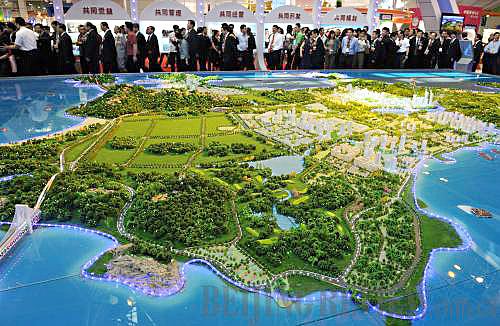|
 |
|
CROSS-STRAITS EXHIBITS: Attendees to the 12th Cross-Straits Fair for Economy and Trade look at a giant blueprint of Pingtan Pilot Area for comprehensive cross-Straits cooperation. The fair was kicked off in Fuzhou, Fujian Province, on May 18, which attracted a record 423 Taiwan companies (JIANG KEHONG) |
Xinjiang's Blessing
China's Central Government will launch a comprehensive support package to pump up economic development and bring lasting stability in the far western Xinjiang Uygur Autonomous Region, said a report of Xinhua News Agency.
A central work conference will be held soon to discuss details of the support scheme and unveil a string of policies.
A roadmap unveiled in March requires 19 affluent provinces and cities including Beijing, Shanghai, Guangdong and Shenzhen to pipe support into different areas of Xinjiang under a "pairing assistance model."
Based on this, government delegations were sent to the region from these provinces and cities for a clear picture of how help can be offered from April 7 to May 8.
The roadmap aims at achieving "marked" improvements in living standards in Xinjiang within five years, and helping the region achieve a "moderately prosperous society in all aspects" by 2020.
Chinese Shoes
The World Trade Organization (WTO) set up an expert panel to investigate and rule on whether the European Union's anti-dumping duties on Chinese-made footwear violate global trade regulations.
The panel was established in response to a second request made by China, which says the EU anti-dumping measures are "inconsistent with related WTO agreements and impaired China's benefits." A previous request in April was blocked by the EU in accordance with related procedures.
It usually takes more than six months for a panel to issue its ruling on a trade dispute. If China wins the case, it can be authorized by the WTO to take appropriate retaliatory measures against the EU anti-dumping duties.
Power Tariff
China will raise power tariff surcharges for some energy-intensive companies by 50 to 100 percent from June 1 in renewed efforts to curb expansions in energy-guzzling and polluting industries, according to a notice on the website of the National Development and Reform Commission (NDRC).
These companies are mainly in the aluminum, cement, steel, zinc, ferroalloy, calcium carbide and sodium hydroxide sectors.
In the notice, the NDRC requires local governments and power suppliers to cancel favorable power rates to aluminum, ferroalloy and calcium carbide makers at a designated date, and halt unapproved preferential power rates in the name of direct trade between power generators and power users immediately.
Similar regulations have been loosely observed at local levels especially since late 2008 when fending off an economic slowdown became a priority agenda.
Steel Investment
Anshan Iron and Steel Group Corp., a conglomerate in northeast China's Liaoning Province, agreed to invest in a steel mill in the United States, the first time for a Chinese company to set up a steel plant overseas.
The Chinese steel maker, also known as Angang, announced on May 17 that an agreement has been signed with U.S. privately owned Steel Development Co.
The steel plant will be built in Amory, Mississippi, and supply to the southeastern United States and Latin America, said Angang in a statement on its website.
The Mississippi state government will offer subsidies to the Amory plant. Investment banks, including Goldman Sachs, are financing the project.
Angang and Steel Development have also inked equipment sourcing and products sales deals. Angang will also send a team of technicians, financial staff and managers to the plant.
The deal is yet to be approved by China's Ministry of Commerce. | 